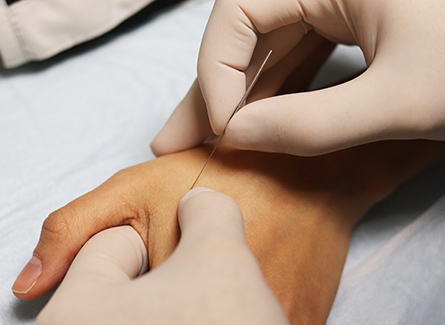Complimentary Treatments for Diabetes Management
April 11, 2025By: Melissa Zalonis
Categories: Diabetes

One in 10 Americans has diabetes, a chronic condition that affects millions of people across the country. While conventional treatments like insulin therapy and medications are commonly used, many individuals seek complementary treatments to manage their condition.
What Are Complimentary Treatments for Diabetes?
Complimentary treatments can provide additional options for those seeking to complement their traditional medical care. They can include natural remedies, lifestyle changes and holistic approaches. Review your diabetes treatment plan with your doctor and weigh which methods might be most effective before trying any additional therapies.
Here are some common complementary treatment approaches for diabetes management:
Practice Mindfulness
It’s no secret that living with diabetes can be overwhelming and stressful, but did you know that depression is more common in people with diabetes? This is due to the relationship between diabetes and depression, where each condition can exacerbate the other. The daily management of diabetes, with its complex and time-consuming self-care behaviors, can lead to frustration, burnout, and helplessness, contributing to higher rates of depression.
But take a deep breath; there’s good news! Research indicates mindfulness and meditation can lower blood pressure, reduce insulin resistance and significantly decrease heart disease rates.
For people with diabetes, meditation offers numerous benefits, including reduced diabetes distress, anxiety and depression. By incorporating meditation into your daily routine, you can foster a sense of calm and peace, making it easier to cope with the challenges of managing diabetes.
Eat a Balanced Diet
Managing diabetes with diet is an individualized approach, and you should always work with your doctor or a registered dietitian to find the right plan for you. The food you consume fuels your body and plays a significant role in diabetes management. Regardless of the specific diet you follow, some universal principles apply to healthy eating:
- Incorporate lean proteins and plant-based protein sources
- Limit added sugars
- Opt for healthy fats
- Minimize processed foods
- Base your meals around non-starchy vegetables
- Drink water or zero-calorie beverages
While there is no one diet to rule them all, some are better than others. For example, the Mediterranean diet is particularly good for people living with diabetes as they emphasize fruits and vegetables, whole grains, beans, nuts and moderate amounts of lean poultry, fish and dairy.
Try Acupuncture Therapy
It’s worth pointing out that acupuncture has been used to treat medical conditions for thousands of years. For diabetes management, new research suggests that acupuncture could be an effective treatment.
One such method that could alleviate symptoms of diabetes is wrist-ankle treatment. This practice deeply stimulates wrist and ankle nerves to address diabetic neuropathy, or nerve damage, as a result of high blood sugar over an extended period of time. However, more research is required to better understand its applications and results, which vary based on the symptoms of diabetes being treated, such as weight loss, metabolism, organ function and nerve pain.
Supplements for Diabetes Management
Some people find supplements to be helpful as part of a comprehensive diabetes management plan. Here are a few common supplements that may support diabetes management:
- Cinnamon: May help improve blood sugar levels.
- Chromium: Can enhance insulin sensitivity.
- Magnesium: Important for glucose metabolism.
- Alpha-Lipoic Acid: An antioxidant that may reduce oxidative stress.
- Berberine: May help lower blood sugar levels.
While supplements can be helpful for some, they can interact with medications and may not be suitable for others. Your doctor and pharmacist can help you determine which supplements, if any, are safe and appropriate for your health needs.
Exercise with Regularity
Exercise is a powerful tool for managing diabetes, offering benefits like reduced stress, lower blood sugar levels and decreased insulin requirements. Exercise is essential for people with diabetes. It’s recommended that you exercise for 150 minutes each week and miss no more than two days of exercise in a row. The Cleveland Clinic highlights five particularly effective exercises for individuals living with diabetes.
While complimentary treatments can offer benefits, it's essential to work with your doctor to find which methods may benefit you the most. Always consult a healthcare provider before starting any new treatment to ensure it is safe and appropriate for your health. To learn more about diabetes care at NKCH and MH, schedule an appointment with your doctor or consult a diabetes educator.



